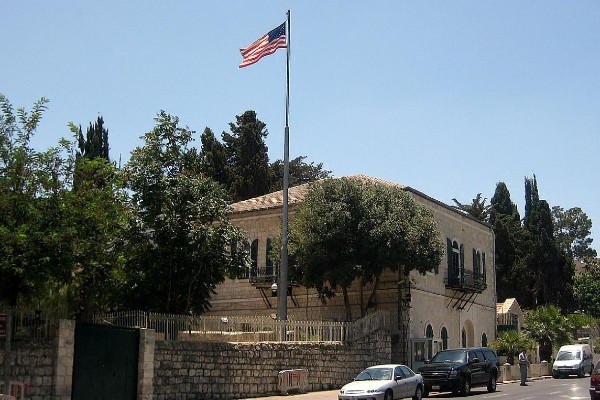The US Jerusalem Embassy Act stresses the unity and indivisibility of Jerusalem as Israel’s capital.
By Itamar Marcus, director, Palestinian Media Watch, via The Jerusalem Post
All too often decisions taken by world leaders have ramifications far broader than intended. While US President Joe Biden’s administration today is talking about reopening a US Consulate in Jerusalem to make it easier for the Palestinian population to receive consular services, the Palestinian Authority sees it as redividing Jerusalem, an act that would violate American law.
American law is quite clear. The US “Jerusalem Embassy Act” repeatedly stresses the unity and indivisibility of Jerusalem as Israel’s capital: “In 1967, the city of Jerusalem was reunited during the conflict known as the Six Day War… Jerusalem has been a united city administered by Israel… Jerusalem should remain an undivided city… recognized as the capital of the State of Israel.”
The PA sees opening the Consulate in Jerusalem as a rejection of all these statutes of American law. Explaining the international implications of the US reopening the Consulate, Palestinian Authority Prime Minister Mohammad Shtayyeh stated that the move is “important” for Palestinians because “the message from this [Biden] administration is that Jerusalem is not one [united Israeli] city and that the American administration does not recognize the annexation of Arab Jerusalem by the Israeli side. We want the American Consulate to constitute the seed of a US embassy in the State of Palestine.” [Facebook page, PA PM Muhammad Shtayyeh, Sept. 14, 2021]
Redividing Jerusalem should not be the US intention, as the ‘‘Jerusalem Embassy Act’’ – which was enacted in 1995, postponed by subsequent US presidents “to protect the national security interests of the United States,” and finally implemented by former president Donald Trump in 2017 – stipulated that the US must move the US Embassy in Israel to the “reunited… undivided” Jerusalem.
Significantly, the Jerusalem Embassy Act explained that declaring Jerusalem the united capital of Israel was merely recognizing what was already its authentic status: “Each sovereign nation, under international law and custom, may designate its own capital. Since 1950, the city of Jerusalem has been the capital of the State of Israel… From 1948-1967, Jerusalem was a divided city and Israeli citizens of all faiths, as well as Jewish citizens of all states, were denied access to holy sites in the area controlled by Jordan. In 1967, the city of Jerusalem was reunited… Jerusalem has been a united city administered by Israel, and persons of all religious faiths have been guaranteed full access to holy sites… The United States conducts official meetings and other business in the city of Jerusalem in de facto recognition of its status as the capital of Israel. In 1996, the State of Israel will celebrate the 3,000th anniversary of the Jewish presence in Jerusalem since King David’s entry… Jerusalem should remain an undivided city… Jerusalem should be recognized as the capital of the State of Israel.”
Recognizing Jewish History
US law is saying that recognizing Jerusalem as Israel’s capital was not only to acknowledge its de facto status but also to recognize its Jewish history. In addition, the Embassy Act notes that from 1948 to 1967, part of the city was under Jordanian control, and not Palestinian. By reviewing Jerusalem’s history, the American law is recognizing that Jerusalem has a rich Jewish history when it first became Israel’s capital 3000 years ago, never had Palestinian Arab sovereignty, is currently ruled properly by Israel allowing access to people of all faiths, and therefore should remain Israel’s undivided capital.
When the American Embassy was opened in Jerusalem the US Consulate, which was superfluous in unified Jerusalem, was closed. The PA wants the US to reopen the Consulate in Jerusalem because for them it means that Jerusalem is being redivided. Certainly, much of the international community would see the opening of a US consulate as the PA sees it, which would have a detrimental impact on Jerusalem’s status as Israel’s united capital.
It is unclear whether the US Biden administration intends to undermine the goal of American law. However, even if the US does not intend to declare that it is redividing Jerusalem through reopening the US consulate, sometimes actions speak louder than intentions.
This article was originally published in the The Jerusalem Post.
